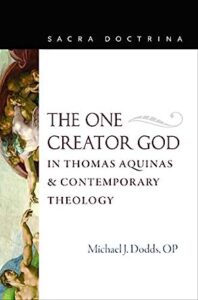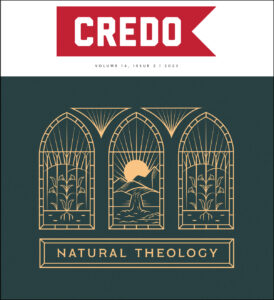M ost of us have probably heard the phrase, “don’t miss the forest for the trees,” or something along those lines. The point being that when lost in the small details of a particular setting or situation you may miss the beauty of the larger picture. The theology of Thomas Aquinas is the forest. While there are many particulars and nuances worth noting in all of his writing, many will get lost along the trail. Caught up in details, responses to certain questions, and terminological distinctions, some miss the larger doctrinal point. This is not to say that these details and particulars don’t matter, because they are essential to his argument. It is instead to say that there is a time for particular and detailed reading and a time for the thousand-foot view of the work. There must be an appropriate measure on both the forest and the tree so one can better understand the composition of the land. The same is said about Aquinas.
ost of us have probably heard the phrase, “don’t miss the forest for the trees,” or something along those lines. The point being that when lost in the small details of a particular setting or situation you may miss the beauty of the larger picture. The theology of Thomas Aquinas is the forest. While there are many particulars and nuances worth noting in all of his writing, many will get lost along the trail. Caught up in details, responses to certain questions, and terminological distinctions, some miss the larger doctrinal point. This is not to say that these details and particulars don’t matter, because they are essential to his argument. It is instead to say that there is a time for particular and detailed reading and a time for the thousand-foot view of the work. There must be an appropriate measure on both the forest and the tree so one can better understand the composition of the land. The same is said about Aquinas.
Michael J. Dodds, author of The One Creator God in Thomas Aquinas & Contemporary Theology, does not direct his readers to any particular tree. Instead, he stands above Thomas’s explanation of the Doctrine of God and gives a lay of the land. Doing so allows Dodds to accurately and sufficiently cover something as large as the Summa Theologia. Dodds’s resource is helpful for a contemporary audience as it explains a medieval author in light of modern science and current issues.
Dodds presents a two-part foundation to the reasoning of Aquinas. The first foundational idea is Thomas’s Five Ways – natural arguments for the existence of God. Any reader of Aquinas will immediately recognize this concept. While these arguments are philosophical in nature they are applied to, and in line with, a Scripture-grounded theology. The arguments presented in Thomas’s Five Ways are brought up time and time again throughout Dodds’s work.
The second part of this foundation is found in the transcendence/immanence distinction. While distinct from one another in definition these two distinctions are far closer related than often thought (69-72). As Dodds notes, “God’s transcendence, therefore, does not contradict his immanence but is in a sense its ground” (69). This understanding of God’s transcendence and immanence assists the reader to think of God as entirely different than creation without being disconnected from humanity. These two terms, transcendent/immanent, may not show up in every chapter, but they play an underlying role in the Aquinas’s construction of his doctrine of God. This understanding, therefore, should be kept in mind as one reads the book.
The One Creator God in Thomas Aquinas & Contemporary Theology is a simple one volume resource for anyone starting to read Thomas Aquinas. While it is not a holistic work, covering everything Aquinas wrote, it accurately and accessibly covers content found in the Prima Pars of the Summa Theologia. While commentaries on Aquinas can sometimes complicate rather than instruct, Dodds constructs a clear processional work that condenses and simplifies the various doctrinal details. However, Dodds does not only interact with the thought of Aquinas but also addresses his own contemporary counterparts and offers remedies to modern issues. What then is the best way to internally categorize this book?
The introduction serves the reader greatly as Dodds does not waste a single page. Dodds provides a simple examination of the life of Aquinas, all of which circulates around Aquinas’s primary question in life, “What is God?” In an effort to answer this question Dodds finds it essential to first examine Thomas’s philosophical and theological methodology. Thomas’s theological system in was prototypical of his day: a blending of theological faith and philosophical reasoning, truly an effort of faith seeking understanding. Through careful blending of general and divine revelation Aquinas is able to craft an articulate and precise doctrine of God, one that finds its answers both in creation and Scripture.There must be an appropriate measure on both the forest and the tree so one can better understand the composition of the land. The same is said about Aquinas. Click To Tweet
From this point forward Dodds works through the Summa Theologia. Dodds, to the benefit of the reader, shows the timeless importance of understanding doctrine. As each chapter is presented Dodds connects the theological questions to popular concerns regarding the doctrine of God. Dodds does not focus on minor differences but on core issues surrounding theology proper: the problem of evil, impassibility, free will and more. While these issues are not new, Dodds brings them to a new light. He suggests that a Thomistic remedy to modern issues can be found in the seemingly paradoxical nature of transcendence/immanence. According to Dodds, modern readers must overcome a language barrier.
The issue is how we name God. Dodds suggests that contemporary theologians like “to think of God and creatures univocally – implicitly to view God as a being like any other” (155). Failing to recognize God as a distinct being who is wholly and entirely different than creatures is the root of many problems faced in contemporary theology. The resolution is to first understand that God is a wholly different being, not just a bigger and better version of man. This concept is what the Five Ways demonstrate. God, as an entirely different kind of being, must transcend His creation.
This transcendence does not render God disconnected. Rather, it means that God who can actually be intimate and close to all without being fused with all. In this way he is the beginning and the end of all things. As both the foundation and telos of everything, the Lord is far more connected to creation that one could imagine. It is in this way that the Lord is able to do as he pleases regardless of what humans may find fitting. These thoughts run through the entirety of Dodds’s work. Every chapter demonstrates how the doctrine of a transcendent God is important to the life of the creature.
At the end, Dodds provides two different indexes for the reader. Index 1 is a very helpful primer. I would even go as far as to recommend reading this before starting the work. Dodds works through key terms and phrases used in the writing of Thomas Aquinas. This appendix aids the reader in being able to move smoothly throughout the entire book. Even if the reader is knowledgeable in this field it is a good refresher and is valuable nonetheless. However, appendix 2 seems unnecessary. Though the goal is good, showing that monotheism goes as far back as creation, Dodds does not interact with expected sources and readers may find its inclusion a bit odd. Though still valuable, appendix 2 seems to fall outside the scope of the book’s main focus.
Dodds successfully assembles a plethora of information in a concise and readable book. I recommend this book but am convinced that it does require prior knowledge to best understand. It would be difficult for an inexperienced theologian to pick up this work and expect it to benefit without additional research. While the new theologian will surely be able to take something from Dodds’s construction of Thomas, they will most likely want to start elsewhere. After such they can return to this work to deepen their understanding before taking to the Summa itself. And there, in such assimilation to the knowledge of the triune God may the reader be “ever grounded in the abiding love and goodness and happiness of God” (157).


